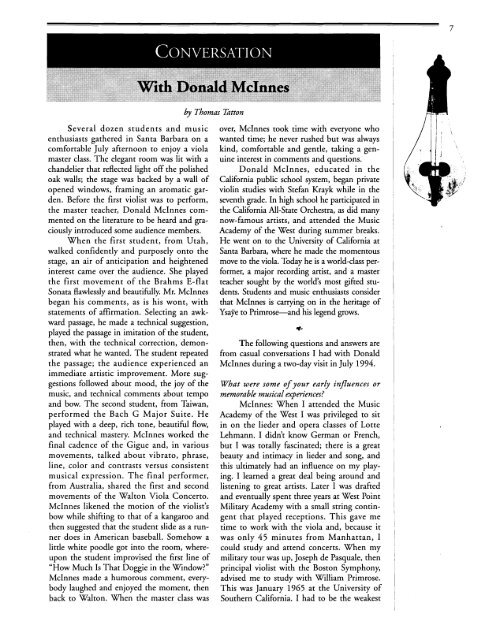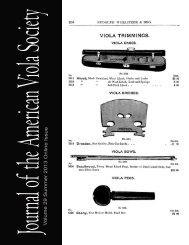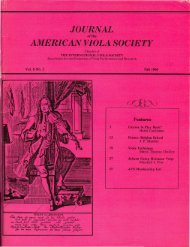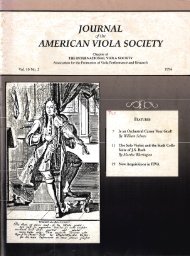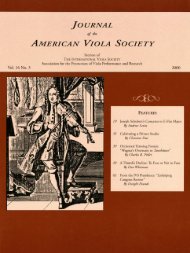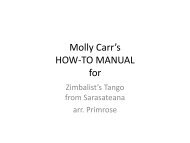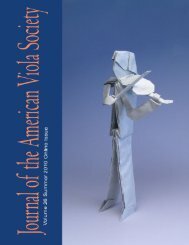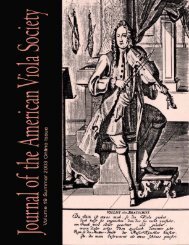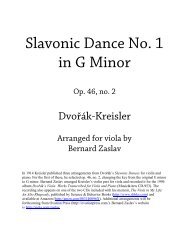Curtin & Alf wentfar beyond anything I expected. My viola is ...
Curtin & Alf wentfar beyond anything I expected. My viola is ...
Curtin & Alf wentfar beyond anything I expected. My viola is ...
You also want an ePaper? Increase the reach of your titles
YUMPU automatically turns print PDFs into web optimized ePapers that Google loves.
Several dozen students and music<br />
enthusiasts gathered in Santa Barbara on a<br />
comfortable July afternoon to enjoy a <strong>viola</strong><br />
master class. The elegant room was lit with a<br />
chandelier that reflected light off the pol<strong>is</strong>hed<br />
oak walls; the stage was backed by a wall of<br />
opened windows, framing an aromatic garden.<br />
Before the first viol<strong>is</strong>t was to perform,<br />
the master teacher, Donald McInnes commented<br />
on the literature to be heard and graciously<br />
introduced some audience members.<br />
When the first student, from Utah,<br />
walked confidently and purposely onto the<br />
stage, an air of anticipation and heightened<br />
interest came over the audience. She played<br />
the first movement of the Brahms E-flat<br />
Sonata flawlessly and beautifully. Mr. McInnes<br />
began h<strong>is</strong> comments, as <strong>is</strong> h<strong>is</strong> wont, with<br />
statements of affirmation. Selecting an awkward<br />
passage, he made a technical suggestion,<br />
played the passage in imitation of the student,<br />
then, with the technical correction, demonstrated<br />
what he wanted. The student repeated<br />
the passage; the audience experienced an<br />
immediate art<strong>is</strong>tic improvement. More suggestions<br />
followed about mood, the joy of the<br />
music, and technical comments about tempo<br />
and bow. The second student, from Taiwan,<br />
performed the Bach G Major Suite. He<br />
played with a deep, rich tone, beautiful flow,<br />
and technical mastery. McInnes worked the<br />
final cadence of the Gigue and, in various<br />
movements, talked about vibrato, phrase,<br />
line, color and contrasts versus cons<strong>is</strong>tent<br />
musical expression. The final performer,<br />
from Australia, shared the first and second<br />
movements of the Walton Viola Concerto.<br />
McInnes likened the motion of the viol<strong>is</strong>t's<br />
bow while shifting to that of a kangaroo and<br />
then suggested that the student slide as a runner<br />
does in American baseball. Somehow a<br />
little white poodle got into the room, whereupon<br />
the student improv<strong>is</strong>ed the first line of<br />
"How Much Is That Doggie in the Window?"<br />
McInnes made a humorous comment, everybody<br />
laughed and enjoyed the moment, then<br />
back to Walton. When the master class was<br />
CONVERSATION<br />
by Thomas Tatton<br />
over, McInnes took time with everyone who<br />
wanted time; he never rushed but was always<br />
kind, comfortable and gentle, taking a genuine<br />
interest in comments and questions.<br />
Donald McInnes, educated in the<br />
California public school system, began private<br />
violin studies with Stefan KJayk while in the<br />
seventh grade. In high school he participated in<br />
the California All-State Orchestra, as did many<br />
now-famous art<strong>is</strong>ts, and attended the Music<br />
Academy of the West during summer breaks.<br />
He went on to the University of California at<br />
Santa Barbara, where he made the momentous<br />
move to the <strong>viola</strong>. Today he <strong>is</strong> a world-class performer,<br />
a major recording art<strong>is</strong>t, and a master<br />
teacher sought by the world's most gifted students.<br />
Students and music enthusiasts consider<br />
that McInnes <strong>is</strong> carrying on in the heritage of<br />
Ysaye to Primrose-and h<strong>is</strong> legend grows.<br />
The following questions and answers are<br />
from casual conversations I had with Donald<br />
McInnes during a two-day v<strong>is</strong>it in July 1994.<br />
What were some ofyour early influences or<br />
memorable musical experiences?<br />
McInnes: When I attended the Music<br />
Academy of the West I was privileged to sit<br />
in on the lieder and opera classes of Lotte<br />
Lehmann. I didn't know German or French,<br />
but I was totally fascinated; there <strong>is</strong> a great<br />
beauty and intimacy in lieder and song, and<br />
th<strong>is</strong> ultimately had an influence on my playing.<br />
I learned a great deal being around and<br />
l<strong>is</strong>tening to great art<strong>is</strong>ts. Later I was drafted<br />
and eventually spent three years at West Point<br />
Military Academy with a small string contingent<br />
that played receptions. Th<strong>is</strong> gave me<br />
time to work with the <strong>viola</strong> and, because it<br />
was only 45 minutes from Manhattan, I<br />
could study and attend concerts. When my<br />
military tour was up, Joseph de Pasquale, then<br />
principal viol<strong>is</strong>t with the Boston Symphony,<br />
adv<strong>is</strong>ed me to study with William Primrose.<br />
Th<strong>is</strong> was January 1965 at the University of<br />
Southern California. I had to be the weakest<br />
7


